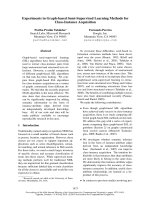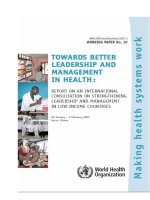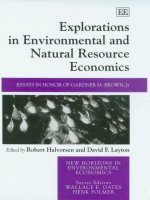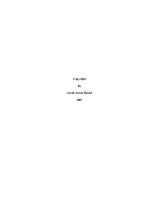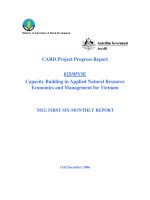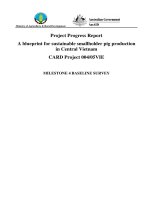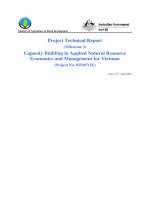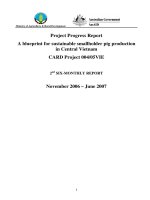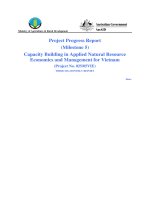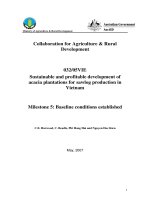Project Technical Report:" Capacity Building in Applied Natural Resource Economics and Management for Vietnam - Milestone 5 " docx
Bạn đang xem bản rút gọn của tài liệu. Xem và tải ngay bản đầy đủ của tài liệu tại đây (377.28 KB, 32 trang )
Ministry of Agriculture & Rural Development
Project Progress Report
(Milestone 5)
Capacity Building in Applied Natural Resource
Economics and Management for Vietnam
(Project No. 025/05VIE)
THIRD SIX-MONTHLY REPORT
Date:
Table of Contents
1. Institute Information 1
2. Project Abstract 2
3. Executive Summary 2
4. Introduction and Background 3
4.1 Project Objective 3
4.2 Key Stakeholders 3
4.3 Project Approach 4
4.4 Methodology 4
5. Progress to Date 5
5.1 Implementation Highlights 5
5.2 Smallholder Benefits 5
5.3 Capacity Building 6
5.4 Publicity 6
5.5 Project Management 7
6. Report on Cross-Cutting Issues 7
6.1 Environment 7
6.2 Gender and Social Issues 7
7. Implementation and Sustainability Issues 7
7.1 Issues and Constraints 7
7.2 Options 8
7.3 Sustainability 8
8. Next Critical Steps 8
9. Conclusion 8
10. Statutory Declaration Error! Bookmark not defined.
11. Project Progress Against Proposed Objectives, Outputs, Activities And Inputs 9
Annex 1 Detailed description of proposed/performed project activities and outputs 13
Annex 2 Workshop Questionnaires, Extension Workshops, January 2007 17
Annex 3 CARD Extension Course: Natural Resource Economics and Management, Hanoi,
16-20 July 2007 23
Annex 4 List of Participants; Extension Workshop, Hanoi, 16-20 July 2007 24
Annex 5 CARD Extension Course: Natural Resource Economics and Management, Soc
Trang, 23-27 July 2007 26
Annex 6 List of Participants; Extension Workshop Soc Trang, 23-27 July 2007 27
Annex 7 Workshop Competency Tests and Evaluations, July 2007 28
i
1. Institute Information
Project Name
Capacity Building in Applied Natural Resource
Economics and Management for Vietnam
Vietnamese Institution
Faculty of Economics and Rural Development,
Hanoi Agricultural University
Gialam, Hanoi, Vietnam
Vietnamese Project Team Leader
Mr. Tran Dinh Thao
Australian Organisation
Faculty of Agriculture, Food and Natural Resources
University of Sydney, NSW, 2006, Australia
Australian Personnel
Emeritus Professor Thomas Gordon MacAulay
Date commenced
January 1, 2006
Completion date (original)
June 30, 2008
Completion date (revised)
Reporting period
6 Months
Contact Officer(s)
In Australia: Team Leader
Name:
Emeritus Prof. T. Gordon MacAulay
Telephone:
61 2 9888 9600
Position:
Emeritus Professor
Fax:
61 2 9888 5821
Organisation
Faculty of Agriculture, Food and
Natural Resources
University of Sydney, NSW 2006,
Australia
Email:
In Australia: Administrative contact
Name:
Ms. Luda Kuchieva
Telephone:
61 2 9351 7903
Position:
Administration officer
Fax:
61 2 9351 3256
Organisation
Research Grants
University of Sydney,
NSW 2006, Australia
Email:
In Vietnam
Name:
Mr. Tran Dinh Thao
Telephone:
84 48 769 770
Position:
Senior Lecturer, Vice Dean
Fax:
84 48 276 554
Organisation
Faculty of Economics and Rural
Development
Hanoi Agricultural University
Gialam, Hanoi, Vietnam
Email:
Or
1
2.
Project Abstract
With very rapid growth and development in Vietnam, there is a danger of overuse and
mismanagement of natural resources, thus compromising sustainable development. The level of
knowledge, understanding and use of the principles of natural resource economics (NRE) and
management is limited in Vietnamese agriculture. The designed outcome of the project is to begin to
have resource management concepts used in various institutions in Vietnam (Universities, MARD,
and the extension system) and to strengthen the ability to deliver knowledge, set policies and advise
farmers in this area. This outcome is being approached through a participatory approach using
workshops in Vietnam on natural resource economics held by the University of Sydney staff and the
staff of the participating organizations. One training workshop each in Hanoi and Can Tho, and four
extension workshops, two each in Hanoi and Can Tho, Vietnam have already been conducted at the
provincial level by Vietnamese staff with participation of the University of Sydney team members,
thus transferring the acquired knowledge to extension specialists and thereby eventually to
smallholder farmers. Two of the Vietnamese scholars had three-month visits to the University of
Sydney in 2006 and two more Vietnamese scholars have visited Sydney from August- October 2007
so as to broaden their understanding of NRE and to undertake research projects unde the guidance of
academics at the University of Sydney. In the next stage, five training workshops/field days with
farmers will be conducted to demonstrate the use and practical knowledge and skills in resource
mana
g
ement.
3. Executive Summary
The project is aimed at strengthening the teaching and research capacity in the field of
natural resource economics in several key Vietnamese Institutions (a number of
Universities, MARD and provincial and regional extension systems) and encouraging the
transfer of knowledge from the University teaching and research staff to extension staff and
farmers. The project is also designed to strengthen the use of resource management
concepts in Vietnam through a participatory approach using training workshops in Vietnam
on natural resource economics in three stages.
First Stage (Reported in 1
st
Six Monthly Report)
Second Stage (a part of the second stage was also reported in 2
nd
Six Monthly Report)
As a part of the second stage of the project two extension workshops were held at Hanoi
(26 participants) and Can Tho (20 participants) in July 2007. The aim of the workshops
was to address the strategic questions of strengthened and broadened capacity for
economics training of extension personnel in Vietnam. In the second stage of the project,
collaboration on curricula in natural resource and environmental economics with HAU and
Can Tho University has been intensified.
Two research scholars from Vietnam arrived at The University of Sydney (Ms. Thi Thu
Huyen Nguyen on 1
st
August 2007 and Mr. Linh Duy Nguyen on 8
th
August 2007), to
undertake guided research projects and to have the opportunity to broaden their knowledge
of natural resource economics. It was an opportunity for these scholars to interact with the
academic staff and to use the facilities of the University of Sydney.
2
In the third stage of the project, pilot extension workshops for farmers will be conducted
with a focus on economically efficient natural resource management, where practical
knowledge and skills in resource management will be demonstrated and discussed. The
participants in the extension workshops will lead these workshops.
4.
Introduction and Background
As Vietnam is experiencing rapid development and exposure to markets, enormous pressure
is put on the nation’s natural resources. Because of market imperfections and failures,
especially with respect to various natural resources, there is a danger of resource overuse
and collapse, resulting in economic inefficiencies, and social and environmental problems.
Adequate knowledge of economics and the management of natural resources becomes a
crucial factor in the quest for stable and sustainable long-term development. Such
knowledge is lacking at the academic, research and extension levels and therefore also at the
farm level. This project will strengthen the teaching and research capacity in the field of
natural resource economics in several key Vietnamese institutions of higher education
(Hanoi Agricultural University (HAU), Hue College of Economics (HCE), Can Tho
University (CTU) and the Ministry of Agriculture and Rural Development (MARD),
Xuanmai Forestry University, Thai Nguyen University, National Centre for Extension, and
the College for Agriculture and Rural Development Managers). This will, in part, be
accomplished through assistance in curriculum development and course design and transfer
of research expertise and an ongoing interaction with the academic staff responsible for
courses. The project is also designed to foster links between the Universities and extension
system and will encourage the transfer of knowledge from the university teaching and
research staff to the extension staff. The University of Sydney staff members who are part
of the team are currently involved in teaching and research activities concerning water, land
and fisheries economics, as well as the economics of the environment and sustainable
development
.
4.1 Project Objective
The project links to the CARD strategic objective 2.1 of increasing rural productivity and
particularly 2.1.1 of increasing agricultural efficiency and competitiveness. The project also
links to strategic objectives 2.4 of reducing vulnerability to environmental and economic
shocks and the intermediate objective 2.4.2 of increasing stability of household incomes
through encouraging diversification of production and marketing.
4.2 Key Stakeholders
There are three levels of stakeholders/beneficiaries that have been directly and indirectly
targeted by the project. The first level is comprised of academic, research and policy
analysis staff at the Vietnamese institutions of higher education (Hanoi Agricultural
University (HAU), Hue College of Economics (HCE), Can Tho University (CTU) and the
Ministry of Agriculture and Rural Development (MARD), Xuanmai Forestry University,
Thai Nguyen University, National Centre for Extension, and the College for Agriculture and
Rural Development Managers). They have benefited through training sessions in Vietnam
held by University of Sydney staff and through visits to Australia by four research scholars
from the Vietnamese these institutions. The aim was to specifically address their capacity to
pass on the acquired knowledge to the next level of beneficiaries – the extension specialists
at the provincial level and the Departments of Agriculture and Rural Development (DARD)
staff members. The extension specialists have benefited through the workshops within this
3
project conducted in Vietnam by the Vietnamese universities (two training workshops, one
each in Hanoi and Can Tho and four extension workshops, two each in Hanoi and Can Tho
have been held). Through a variety of consultations and the training it is expected that
natural resource economics principles will be incorporated into the guidelines, directives
and advice that provincial level authorities provide for farmers. The transmission to farmers
will be through the district and community level extension specialists. Within the project,
several pilot workshops will be conducted at this level to initiate the knowledge transfer
process. The farmers are expected to directly benefit from these workshops through gaining
skills in more efficient management of natural resources on the farm, as well as greater use
of more sustainable farming practices. It is to be expected that many of the ideas and
information presented in the workshops will filter through the agricultural system in a whole
variety of ways.
4.3 Project Approach
The proposed project is designed to strengthen capacity in natural resource economics in
Vietnam in a layered framework. In the first layer, and after considerable consultation, the
University of Sydney staff have provided research, teaching and policy analysis training to
Vietnamese academics, policy analysts and extension specialists at a national level. This
training was based in the context of the problems and issues identified in the farmer
surveys. In the second layer, those trained in the first layer trained the extension specialists
and policy analysts at a provincial level (two extension workshops). The training was
basically designed to impact the advice and information provided to farmers on the use of
natural resources. This was demonstrated through two more district level workshops (one
each in Can Tho and Hanoi). In the third layer, pilot extension workshops for farmers are
being conducted, with a focus on economically efficient natural resource management. The
University of Sydney will provide assistance in this process through participation and input
to the design of the extension workshops. However, the participants in the extension
workshops will provide the basic training so they have an opportunity, under some
guidance, to develop skills in presenting this material at the farm level. The approach to
capacity building through workshops and training sessions has been successfully
implemented in a previous CARD project (Pilot Program).
4.3.1 Institutional Capacity Building: The approach to institutional capacity building is
through four types of activities: training workshops; curriculum development at the level
of Vietnamese institutions (Universities and MARD); visits of a small number of research
scholars from Vietnamese institutions to Australia; and fostering and initiating joint
research projects in the area of natural resource economics.
4.3.2 Communication/Outreach Approach. The main approach to communication and
outreach is being made through extension workshops that have been conducted in the
Mekong Delta at Can Tho University, and in the north of Vietnam at Hanoi Agricultural
University (two extension workshops each have been held in Hanoi and Can Tho). These
workshops addressed the strategic questions of strengthened and broadened capacity for
natural resource management training of extension personnel in Vietnam. Once this
capacity is strengthened it will provide a continuing human resource base, which can be
sustained into the future. This will also result in an improved advisory capacity of the
selected extension staff (emphasis was placed on ensuring that a reasonable balance of both
males and females are trained and that participants from the north, the south and the central
provinces of Vietnam have been involved) and an improved ability to provide advice with
an economic content in relation to resource use at the farm level.
4.4 Methodology
4
4.4.1 R&D Methodology: The research approach used in the project is through scholars
undertaking research into a set of quite specific resource use issues designed to provide
background for the training modules and to expand the knowledge base in resource
management . Where appropriate this research will also feed into the curriculum
development process.
It is envisaged that the project will have a significant research component in the form of
economic analysis of the issues related to aquaculture, water use, land use and farm
forestry. Two studies on aquaculture have already been completed to varying degrees. The
associated research papers are entitled “The Efficiency of Prawn Production in the Mekong
Delta” by Ms. Do Thi Den which was presented to the AARES Annual Conference in
January 2007 in Queenstown, New Zealand and “Alternative Systems of Shrimp Culture in
The Lagoon Area of Thua Thien, Hue, Vietnam” by Ms. Le Thi Kim Lien (a working
paper). Two more studies on natural resource economics have been conducted by the
second group of visiting scholars, Mr. Linh Duy Nguyen and Ms. Thi Thu Huyen Nguyen.
It is intended to develop simple examples using computer simulation in spreadsheets as
applied to a variety of cases of on-farm resource issues.
4.4.2 Participatory Methods: On-going consultations with the major stakeholders will be
conducted in order to, in the first place determine the nature of the training and extension
activities, and subsequently to obtain feedback and then re-address some of the key issues.
This will assist in developing the priority areas for training. The expertise in HAU in
participatory extension will be fully utilised (Linh, 2004). The case study material will be
developed in consultation with extension personnel and a small number of farmers. Care
will be taken to also ensure a balance of males and females in these consultations
5. Progress to Date
5.1 Implementation Highlights
- Extension workshops held in Hanoi (16-20 July 2007) with 26 participants and Soc
Trang (23-27 July 2007) with 20 participants (refer to Annex 3-6 for details and
attached workshop presentation slides).
- Two research scholars; Ms. Thi Thu Huyen Nguyen and Mr. Linh Duy Nguyen visited
The University of Sydney for three months as visiting scholars in August 2007. Their
stay in Sydney will be up to the end of October 2007.
- A workshop evaluation report is being prepared for the extension workshops held in
Hanoi and Can Tho in January 2008.
5.2 Smallholder Benefits
Smallholder benefits from the project are expected to start flowing as a result of both the
first and second set of extension workshops. The first set of workshops were targeting
predominantly provincial level extension staff who are expected to pass on some of the
gained knowledge further down the extension chain. In addition, the second set of
workshops (conducted in July, 2007) were aimed at district level extension workers with an
expectation that increasing their capacity to deliver extension in natural resource economics
5
will result with more direct smallholder benefits. Overall, while the smallholder benefits
from this project are expected to take some time (3-5 years) to start being apparent, a
number of the necessary steps have been undertaken towards the planned delivery of those
smallholder benefits.
5.3 Capacity Building
Capacity building is an integral part of the project design. The second stage of the project
includes a significant amount of training in extension methods related to natural resource
use in the extension workshops held at Hanoi and Can Tho in July 2007 and January 2008.
These workshops addressed the strategic questions of strengthened and broadened capacity
for natural resource management training of extension personnel in Vietnam. The
workshops were also aimed at improving the advisory capacity of the selected extension
staff and also improving the ability to provide advice with an economic content in relation
to resource use at the farm level.
At each of the workshops held in July 2007 in Hanoi and in Soc Trang pre- and post-
knowledge evaluations were undertaken along with a post workshop evaluation (Annex 2).
For the competency evaluations there were apparent gains for all but one of the questions in
each location. In Hanoi there appeared to be some confusion about the nature of an
externality and in Soc Trang some confusion about the effects of a pesticide tax. There
were strong gains in responses for most of the other questions. The overall evaluations of
the quality of the workshops measured with a weighted average score were 8.1 out of 10
for Hanoi (a very good score) and for Soc Trang a score of 6.4 out of 10. In Hanoi there
was a lower score about the appropriateness of the length of the workshop (most likely
indicating it was too short). In Soc Trang the weaker results were in relation to the
appropriateness of the length of the workshop and the balance of the topics. Overall, the
results of the evaluations seem generally very satisfactory.
Two research scholars from Vietnam arrived at The University of Sydney (Ms. Thi Thu
Huyen Nguyen on 1
st
August 2007 and Mr. Linh Duy Nguyen on 8
th
August 2007), so as to
broaden their understanding on Natural Resource Economics. Their stay at Sydney,
Australia was for three months and during this period the visiting scholars worked on mini
research projects related to Natural Resource Economics. Ms. Thi Thu Huyen worked on
research entitled “Evaluating the Benefits of Site Specific Crop Management of Nitrogen
Application to Rice Production” and Mr. Linh Duy Nguyen on research entitled “Valuing
the option to convert from extensive to intensive farming of shrimp production in
Vietnam”. (The details of the research will be provided in the project milestones 6 and 7.)
5.4 Publicity
The publicity for the extension workshops conducted in July 2007 was through publishing
information in the newsletter of Hanoi Agricultural University. Information has also been
placed on the project website.
6
5.5 Project Management
The project team in Sydney have set up a series of approximately fortnightly meetings and
links to the project team in Vietnam using email. This has been effective in ensuring
activities are suitably co-ordinated and that preparation for workshops is completed on
time.
6. Report on Cross-Cutting Issues
6.1 Environment
The environmental impact of the project is expected to be positive. The main aim of the
project is to train individuals in key Vietnamese institutions, extension personnel and
ultimately farmers and resource managers to manage their resources in a sustainable and
environmentally friendly way. Rather than simply focusing on the more intensive use of the
resources to increase output, the project will emphasise the efficiency in resource use in its
inclusive sense. Efficiency comprises overall social efficiency (including environmental
values) rather than simply maximizing value of the output. Based on experience in
Australia, the University of Sydney can provide training that addresses some of the
problems with natural resource management. Because Vietnam is undergoing an intensive
period of change and development with a focus on economic growth, such transfer of
experience will hopefully result in more efficient and sustainable resource use, rather than a
repeat of mistakes that Western societies have made in the past. The project will address
the importance of various aspects of resource use, including those not obvious or apparent
at the moment, but important for long-term sustainable resource use. These include
accounting for amenity values of environmental assets, and accounting for resource
scarcity, where the institutional framework may not mean that resource scarcity is properly
reflected in prices.
6.2 Gender and Social Issues
In the extension workshops held in Hanoi and Soc Trang in July 2007 the balance between
males and females was as follows:
Hanoi 20 males and 6 females
Can Tho 13 males and 7 females
7. Implementation and Sustainability Issues
7.1 Issues and Constraints
The competition for the time of the team members amongst competing activities and the
misplacement of some survey data has been of concern for team members and this has
resulted in delays in reporting on the project milestones.
7
This part will be reported in the project completion report.
The project has achieved the relevant milestones as specified in the project proposal. The
next critical step is to complete the evaluation report for the extension workshops held in
Can Tho and Hanoi in July 2007. Several pilot workshops will be conducted in the North
and South in January 2008 to initiate the knowledge transfer process to farmers. The
farmers are expected to directly benefit from these workshops through gaining skills in
more efficient management of natural resources on the farm, as well as greater use of more
sustainable farming practices. The next major milestone to be completed is the Research
Technical Report No. 2 followed by a pilot training program in July 2008.
7.2 Options
The time constraints, in both Sydney and in Vietnam with growing student numbers, are a
difficult challenge. Efficient use of the available time has been essential. More detailed
and careful management for storage of documents has been implemented.
7.3 Sustainability
The project is involved in human capacity building. It therefore is long-term and has an
ongoing effect for the life of those being trained. In addition, the capacity developed will
be transmitted and sustained through use in academic institutions and eventually the
extension systems and to farmers.
8. Next Critical Steps
9. Conclusion
8
11. Project Progress Against Proposed Objectives, Outputs, Activities And Inputs
Project Title: Capacity Building in Applied Natural Resource Economics and Management for Vietnam
Vietnamese Implementing Institution: The Faculty of Economics and Rural Development
Hanoi Agricultural University
PROPOSAL PROGRESS REPORT ( 3)
Narrative Information Required Performance
Measures
Assumptions Information Required
OBJECTIVES
General Objective
To increase the application of the principles
of natural resource economics and
management in the Vietnamese higher
education sector, policy formation bodies,
extension system and ultimately
smallholder farms and resource managers
.
Specific Objectives
1. To increase training and research
capacity of the Vietnamese Universities
in natural resource economics.
2. To increase the capacity of the extension
system to provide advice on sustainable
and efficient use and management of
natural resources.
Policy changes in
funds dedicated to
natural resource
management; number
of regions and
districts wher
extension workshops
will have been held;
changes to
curriculum
Implementation of
knowledge builds
through the project
e
Number of staff
trained,
Number of research
publications >3,
Number of courses
using material from
training programs in
the curriculum
Number of extension
staff trained
(with a special
consideration of the
number of female
Administrative support
Time availability
Motivation to learn is
high
Administrative support
Time availability
Motivation to learn is
Policy changes needs longer time horizon.
Curriculum change has been initiated.
Reported in 1
st
progress report
25 (Hanoi) + 26 (Can Tho) provincial level extension staffs
participated in second workshops (January 2007).
9 female participants in Can Tho and 6 in Hanoi (January 2007)
9
3. To increase understanding and
application of natural resource
economics in policy setting by MARD.
4. To increase farmer awareness and
application of principles of natural
resource economics use and
management.
staff trained).
Regional emphasis.
Number of MARD
staff involved in
training program.
Number of farmers
contacted by trained
extension staff
high
Assumed that test
measurements provide
an indication of the
benefit of the
workshops
Attendance at
workshops has an
impact on awareness
26 (Hanoi) + 20 (Can Tho) provincial level extension staff
participated in the second workshops (July 2007).
7 female participants in Can Tho and 6 in Hanoi (July 2007).
Reported in 1
st
Progress Report.
8 Department of Agricultural and Rural Development staff, Hanoi
(July 2007)
20 Extension Station staff at Soc Trang (July 2007)
Still to come (no reason to change)
OUTPUTS
1.1 Curriculum for teaching natural
resource economics and extension at
the Vietnamese Universities
1.2 Research publications
1.3 Training workshops
2.1 Training modules in natural resource
management and extension
2.2 Agricultural modules in natural
resource management and extension
Curriculum
developed
Number of
publications
Number of workshop
participants
Extension packages
of information
developed
Number and gender
mix of extension
specialists trained
Student interest
Staff motivation
Time delays
Assumed that test
measurements provide
an indication of the
benefit of the
workshops
Post training surveys
are a valid measure of
levels of knowledge
changes
Interaction with relevant teaching staff at Hanoi Agricultural
University and CanTho Universities has been continuedin relation
to curriculum development (Reported in Technical Report, Project
Milestone 3).
Two Research papers prepared and one delivered to a conference.
59 Participants for July 2007 Workshop
41 males
18 females
Reported in 1
st
progress report
Post-training surveys generally indicating a significant
impact on understanding of natural resource management
issues surveyed
10
2.3 Agricultural knowledge information
system website
3.1 Policy advice in the form of briefing
notes
3.2 Decision support models in
spreadsheet form
4.1 Brochures/handbooks for farmers
explaining key aspects of on-farm
natural resource management.
Web site operational
Policy briefs written
Decision support
models created
Handbooks prepared
Access available
Policy briefs have an
impact
Reported in 2
nd
progress report
Being updated
Two policy briefs based on research work of the visiting scholars
have been prepared.
Still to come ( no reason to change)
ACTIVITIES
• Trainer Workshops held in Hanoi and
CanTho with up to 30 people (Jul 06)
• Research Scholars chosen and
travelled to Sydney (Jun 06)
•
Mini research projects initiated
(Sept 06)
• Extension Workshops held in Hanoi
and CanTho and discussion held on
possible adoption of material in
academic programs (Jan 07)
• Extension workshops held in CanTho,
Hue and Hanoi (Jul 07)
• Research scholar chosen and travelled
to Sydney (Jul 07)
• Mini research projects initiated (Sept
07)
Reported in 1
st
progress report
Reported in 2
nd
progress report
Extension workshops held in Soc Trang (20 Participants) and Hanoi
(26 Participants with a number from the Central Provinces).
Two research scholars travelled to Sydney in August 2007 as visiting
scholars for the period of 3 months.
11
12
• Pilot ‘Demonstration sessions’ for
farmers in the North and South ((Dec
07)
• Pilot ‘Demonstration sessions’ for
farmers in the North and South and
Centre (Mar 08)
• Project completion meeting, project
report and policy briefs and
discussion held on possible adoption
of material in academic programs
(Jun 08)
Still to come (no reason to change)
INPUTS
5 Australian Personnel with a total of 160
days in Vietnam (including 13 trips to
Vietnam) and 392.5 days in Australia.
10 Vietnamese Personnel with a total of 750
days in Vietnam.
Inputs as indicated in the original project proposal currently remain
as specified.
Cumulative totals
Australian team in Vietnam 110 days
Australian team domestic 360.5 days
Vietnamese team 365 days
Annex 1 Detailed description of proposed/performed project activities and
outputs
Note: Details repeated in this section for documentation and convenience of the reader.
Project Activities
a) Trainer Workshops for Vietnamese academics, MARD staff and National Extension
Centre staff.
2 training courses in Hanoi and Can Tho (one in each location)
- Duration for each training course: 10 days
- Participants: Lecturers in universities (HAU, TUAF, HCE, CTU, UF, etc.), researchers in
institutes, extension personnel at national level, policy analysts from MARD)
- Number of participants: 26 (Hanoi), 19 (Can Tho)
- Preparation:
University of Sydney project members worked on training packages used in workshops
(teaching modules, research materials, demonstration software etc.). Vietnamese
Universities conducted a detailed survey of farmers in various regions of Vietnam (North,
Centre, South) in order to identify the most pressing natural resource issues and summarised
and prioritised the needs for training and research.
- Preliminary Content of the workshops. Content below have been distributed across
workshops appropriately and not necessarily duplicated in each workshop.
1. Introduction to Natural Resource and Environmental Economics (concepts, history, role,
significance, methods, etc.)
2. Market Failure: (reasons, types and solutions). Government Failure.
3. Externalities: Review of microeconomic theory (utility and demand, cost, profits and
supply). Defining the externality. Classification of externalities. Externalities in natural resource
use.
4. Valuation of natural resources and the environment. (Concepts, methods and applications).
5. Property rights (Coase theorem and the role of government in natural resource use).
6. Dynamic efficiency in natural resource use (time, discounting etc.)
7. Natural resource and environmental policy
8. Applied topics in natural resource economics (water economics, fishery economics,
economics of soil conservation, forestry economics). These will be supported by training in
using EXCEL worksheets for optimisation, linear programming, etc.
9. Social impacts of natural resource use and sustainability.
10. Conceptualizing and developing modules for the extension workshops (a small number of
provincial level extension specialists will be invited for consultation purposes).
b) Extension workshops at provincial level and district level
5 workshops in Hanoi (2), Hue (1), Can Tho (2). Two workshops each in Hanoi and Can Tho
have been held.
- Duration for each workshop: five days
- Participants: Officials of extension institutions at provincial level, provincial leaders of
various related departments (DARD), District level extension workers etc.
- Number of participants: 30
- Content: Content below may be distributed across workshops appropriately and not
necessarily duplicated in each workshop. To be decided during the training courses, but
likely to include:
1. Natural resource management, emphasis on specific local resources.
2. Water resource management: Economics of collective water use, water quality and
application volume and timing, water management in a community.
3. Land use management: Economics of land use in terms of crop patterns and alternatives to
rice, economics of soil conservation, land property rights, land pricing, land markets.
4. Aquaculture/fishery resources: Economics of sustainable aquaculture, water quality
management in aquaculture, fisheries management, etc.
5. Forestry: Economics of small-scale forestry, community based forestry management, agro-
forestry combination models, sustainable forestry management, forest conservation, etc.
6. Environment and pollution: solutions for pollution problems (taxes, tradable permits,
standards)
7. Extension methods, extension tools.
13
8. New approaches in agricultural extension
9. Issues related to policy, institutional arrangements, and legal issues.
10. Gender roles in extension
11. Gender in natural resource management
12. Methods and measures in disseminating knowledge and transferring technology
c) Pilot (Demonstration) extension workshops at district (farm) level
5 pilot workshops conducted in districts of the Northern, Central and Southern provinces.
- Duration for each workshop: 2 days
Participants: District and communal level extension workers and farmers from a given
district. To be conducted on a settlements basis and using groups such as Plant protection
Units and Veterinary Stations, Mass Organizations, etc. Farmer training might also involve
Extension Clubs.
- Number of participants: 30
- Content: To be decided during the training and extension workshops, but likely to include:
basic economics principles in natural resource management, applied decision making at the
farm level using novel teaching methods such as games and budget exercises:
- Optimal cropping patterns and soil conservation practices.
- Optimal diets and harvest size for marketing in aquaculture.
- Optimal plant/harvest rotation for farm forestry.
- Optimal crop choice in the face of irrigation canal congestion.
d) Visiting staff from Vietnamese institutions at the University of Sydney
4 visiting scholars from Vietnamese institutions to participate in teaching and research
activities at the University of Sydney (2 scholars have already visited and two to visit in
July 2007)
- Duration: 14 weeks.
- Activities: Attending and participating in lectures in various natural resource and
environmental economics units of study. Visit to NSW Agriculture’s Economics branch
with special emphasis on their extension activities. Participating in various research
activities at the University of Sydney (literature research, data analysis, discussions)
including a completion of a research project and a research seminar on a chosen research
topic given by the Vietnamese scholar.
e) Curriculum for teaching Natural Resource Economics to undergraduate students
Curriculum in natural resource economics to be developed for implementation at the HAU,
CTU and HCE. Contingent on existing units of study to be modified and updated and new
units of study to be designed and proposed.
Duration: on going, but anticipated to start early in the project, so that the deliverables will
be available towards the mid part of the second year of the project.
Activities: Curricula meetings. Joint work on unit proposals. Exchange of teaching
materials and methods.
f) Agricultural knowledge information system website
The material produced and collected during the project will be assembled and posted on a
web site to provide accessibility by the extension staff nation wide. The website may
evolve into a site for the presentation of extension relevant research produced in
universities and suitable for extension staff. It is planned to start with planning activities
related to the web site in the very early stages of the project. A staff member from HAU to
started working on the web design (January 2006) and now the website has been established
and is currently in demo version
(o/card/index.php?newlang=english)
g) Policy briefs
The project will deliver a number of policy briefs (4 – 5) dealing with economically
efficient and _sustainable management of natural resources in Vietnam. The policy briefs
will be produced as a result of research activities on specific natural resources in Vietnam.
This may include: water, soil, forestry, fisheries and aquaculture etc. The briefs will be
compiled, written and delivered to MARD and other interested parties. (2 policy briefs
prepared)
14
h) Potential Research Projects
The following is a pool of potential research projects that could wholly or in part be
conducted within the CARD project framework. These projects were discussed during the
site visit to Vietnam. The idea is to engage the visiting Vietnamese scholars in research
work on some of these projects.
1. Soil conservation in mountainous areas in Vietnam
Soil erosion resulting from current farming practices that do not pay sufficient attention to soil
conservation has become a serious problem especially in the mountainous areas of Northern and
Central Vietnam. Soil erosion has serious consequences at farm, regional and national levels.
The objectives of the research are to devise the least-cost methods to achieve a desired reduction in soil
erosion. This will help farmers and the government to better understand the situation with soil erosion,
its impacts on economic and environmental aspects, and some cost effective ways to mitigate this
problem. The research will identify ways to enhance soil conservation practices, and to produce policy
recommendations for selecting improved soil conservation strategies for farmers in the mountainous
areas of Northern and Central Vietnam.
2. Agro-forestry models for livelihood improvement in mountainous areas in
Vietnam
Poverty, low levels of education, and a lack of awareness on the importance of the forests, coupled
with the lack of economic incentives for forest protection are the main causes of forest destruction in
Vietnam. The forest destruction in turn exacerbates the poverty situation in the mountainous regions.
Re-planting of forests by state forest enterprises and by land allocation to farmers and settlement
projects has been initiated since the early 1980s. However, the lack of incentives for protection
combined with over-exploitation, and early cutting and fire damage has affected large portions of the
afforested areas.
Livelihood improvement of small-scale forestry farmers is thus considered as a key policy objective,
which has to be brought about through better forest management and conservation. However, the
efficient avenues of attaining this objective are still to be identified. Given long-term use rights on
forestland, and the shift from centrally-managed to people-managed forestry, following Resolution No.
10 of the Party in 1989, the state production forestland was divided into small plots and allocated to
poor farmers in 1990. The government is currently attempting to build various agro-forestry models to
be used to assist in more efficient use of allocated land, resulting in improved livelihoods of forestry
farmers.
The aim of the study is to investigate currently used as well as potential agro-forestry models from an
economic perspective, and to evaluate their contribution to the farmers’ livelihood improvements and
environment in the region. This will result in identification of best performing models, to be further
disseminated to farmers.
3. Aquaculture expansion and management challenges in coastal region
Aquaculture is relatively new in many places in coastal regions of Vietnam. As it tends to bring high
initial economic returns, the local governments set up policies prioritizing and supporting aquaculture,
sometimes as the key strategy for socioeconomic development. Aquaculture has therefore expanded
rapidly in the coastal plains of Vietnam.
Along with the aquaculture expansion, associated negative impacts have been observed. Many ponds
and lagoons have been abandoned due to heavy water pollution problems. Dikes, which are used
primarily to prevent salinity intrusion, are constructed ineffectively resulting in abandonment of the
ponds. These impacts are extensive but largely ignored, in part due to insufficient knowledge. The
current practice of overuse of ponds and lagoons may also be encouraged by the push to increase
income under the nationwide oriented diversification of production, without serious consideration of
wider impacts including environmental and natural resource issues.
Currently there is limited research on the entire impact of aquaculture expansion, including the
implications for the environment and natural resources, and the ways to efficiently manage the
aquaculture farming. This warrants a serious investigation on aquaculture expansion and management
challenges from an economic perspective.
The aim of the study is evaluate the impacts of aquaculture expansion in terms of socio-economic and
environmental issues and to provide the local government and other stakeholders with a more general
15
picture related to aquaculture. The study will also produce policy recommendations for improved
aquaculture management.
4. An evaluation of community-based operation and management of small-scale
irrigation schemes
The renovation in the late 1980s provided a framework for important changes in the hydraulic systems
of Vietnam. A vast number of small local systems were created. These systems found a place among
the grid formerly defined by hydraulic schemes of bigger size, centrally managed by specialized State
organizations and irrigation and drainage management companies.
Small systems were created in response to water user’s local demand, who were previously dissatisfied
with respect to centralized water supply systems. Presently, these small systems play an essential part
in irrigation in several districts in Quang Binh province. They help in saving irrigation water and
increasing the crop productivity, by “on time” supply and by the farmers’ participation in related
decision-making.
The project aims to investigate the organizational structures of water user groups and their operations,
to analyse advantages and disadvantages of water user groups as compared to the common irrigation
system, and to produce policy recommendations to enhance the operation and management of the water
user groups.
i) Decision support systems for natural resource management
Throughout the training and research activities project participants will modify existing and
design new digital (computer based) Decision Support Systems for optimal management of
natural resources. These systems will be useful tools for both policy analysts and decision
makers in MARD and the extension staff.
16
Annex 2 Workshop Questionnaires, Extension Workshops, January 2007.
Competency Questionnaire
Extension Workshop on Natural Resource Economics and
Management
(Hanoi, July 2007)
1. Concepts
a) An externality is:
a) something outside economics
b) something outside your country (an international impact)
c) an effect of one person’s or firm’s actions on another person or firm
d) a visitor from outside the region.
b) “Natural resources subject to open access (anyone is free to use/harvest them) tend to be efficiently
exploited.”
True/False?
c) Current use of resources (e.g. soil, water, fish, labour) impacts future availability of those resources
a) for all resources
b) only for non-renewable resources
c) depends on the rate of replenishment of the resources over time
d) Farmers are often slow to adopt practices on their farm that have environmental benefits because
a) farmers are generally backward and do not like to change
b)
many practices with environmental benefits have a low relative advantage for farmers
compared to their current practices
c) the government does not require farmers to adopt these practices
d) the practices are too difficult for farmers to adopt
2. Methods
a) Spreadsheet based software (e.g. Excel) can be used by district level extension workers to advise
farmers on NRM problems
a) Yes, it is currently used
b)
No, because of lack of resources
c) No, because of lack of knowledge
d) No, because it would not be useful
b) “Discounting is a method for expressing future dollar (dong) values in present terms.”
True/False?
3. Extension Practices and Policy
a) A subsidy for water use in irrigation systems will most likely:
a) lead to an inefficient overuse of water
b) be in the national interest by helping only poor farmers
c) will increase water availability to individual farmers in the long run
d) secure revenues for the government.
b) “Extension activity should always be the primary choice for solving natural resource management
questions”
True/False?
d) Liberalisation of the market for land use rights will lead agricultural land to be used:
a) Less Efficient
b) More Efficient
c) Unchanged
d) Not Sure
17
Workshop Evaluation Questionnaire
Extension Workshop on Natural Resource Economics and
Management
(Hanoi, July 2007)
I. Content
1. Did you find the topics covered in the workshop relevant for natural resource management
problems in Vietnam?
Very relevant Relevant Somewhat relevant Not relevant
2 Did you find the topics covered in the workshop relevant for you personal development as
a professional in the area of natural resources?
Very relevant Relevant Somewhat relevant Not relevant
3. Did you think that the topics covering economic theory and topics covering applications of
natural resource economics were well balanced?
Well balanced Balanced Somewhat balanced Not balanced
4. Are you going to pursue some of the topics covered in the workshop in greater detail in
your future professional carrier?
Very likely Likely Somewhat likely Not likely
II. Mode of delivery
1. Did you find the way that the workshop was delivered satisfactory?
Very satisfactory Satisfactory Somewhat satisfactory Not satisfactory
2. What did you think about the length of the workshop?
Very appropriate Appropriate Somewhat appropriate Not appropriate
3.
Did you find the computer-based workshops relevant for your learning?
Very satisfactory Satisfactory Somewhat satisfactory Not satisfactory
III. Quality of delivery
1. What did you think about the quality of the sessions offered?
High quality Average quality Below average quality
2. Were you satisfied with the quality of the supplied material: handbook, handouts,
18
Very satisfied Satisfied Somewhat satisfied Not satisfied
IV. Organisation
1). Were you satisfied with the overall organisation of the workshop (accommodation,
catering, session times, etc.)
Very satisfied Satisfied Somewhat satisfied Not satisfied
5. Feedback
1). What 3 main ideas did you learn as a result of this training course?
1. ……………………………………………………………………………………
………………………………………………………………………………………
2. ……………………………………………………………………………………
………………………………………………………………………………………
3. ……………………………………………………………………………………
………………………………………………………………………………………
2) Please give your recommendation to improve the course.
………………………………………………………………………………………
………………………………………………………………………………………
…………………………………………………………………………………………
…………………………………………………………………………………………
…………………………………………………………………………………………
…………………………………………………………………………………………
…………………………………………………………………………………………
…………………………………………………………………………………………
19
Competency Questionnaire
Extension Workshop on Natural Resource Economics
and Management
, Soc Trang 23-27 July 2007
Name (please PRINT):……………………………………………….
1. Concepts
a) An externality is:
a) something outside economics
b) something outside your country (an international impact)
c) an effect of one person’s or firm’s actions on another person or firm
d) a visitor from outside the region.
b) “Natural resources subject to open access (anyone is free to use/harvest them) tend to be efficiently
exploited.”
True/False?
2. Methods
a) Net present value will allow us to measure:
a) a single period net price of a resource in a market
b) a capitalised value of a flow of income from a resource stock
d) how much profit is made from sales of the resource this period
e) the net amount the stock has grown by this time period.
b) “Discounting is a method for expressing future dollar (dong) values in present terms.”
True/False?
3. Policy
a) A subsidy for water use in irrigation systems will most likely:
a) lead to an inefficient overuse of water
b) be in the national interest by helping only poor farmers
c) will increase water availability to individual farmers in the long run
d) secure revenues for the government.
b) Putting a tax on pesticide use will most likely:
a) increase the output from agriculture
b) reduce the negative health effects from pesticides
c)achieve nothing
d)make the government richer by impoverishing farmers.
c) “Extension activity should always be the primary choice for solving natural resource management
questions”
True/False?
20
Workshop Evaluation Questionnaire
Extension Workshop on Natural Resource Economics
and Management
, Soc Trang 23-27 July 2007
I. Content
1. Did you find the topics covered in the workshop relevant for natural resource management problems
in Vietnam?
Very relevant Relevant Somewhat relevant Not relevant
2 Did you find the topics covered in the workshop relevant for you personal development as a
professional in the area of natural resources?
Very relevant Relevant Somewhat relevant Not relevant
3. Did you think that the topics covering economics principles and topics covering extension in natural
resource economics were well balanced?
Well balanced Balanced Somewhat balanced Not balanced
4. Are you going to pursue some of the topics covered in the workshop in greater detail in your future
professional career?
Very likely Likely Somewhat likely Not likely
II. Mode of delivery
1. Did you find the way that the workshop was delivered satisfactory?
Very satisfactory Satisfactory Somewhat satisfactory Not satisfactory
2. What did you think about the length of the workshop?
Very appropriate Appropriate Somewhat appropriate Not appropriate
III. Quality of delivery
1. What did you think about the quality of the sessions offered?
High quality Average quality Below average quality
2. Were you satisfied with the quality of the supplied material: handbook, handouts, etc.
Very satisfied Satisfied Somewhat satisfied Not satisfied
IV. Organisation
1). Were you satisfied with the overall organisation of the workshop (accommodation, catering, session
times, etc.)
Very satisfied Satisfied Somewhat satisfied
Not satisfied
21
22
V. Feedback
1). What 3 main ideas did you learn as a result of this training course?
1. ………………………………………………………………………………………
………………………………………………………………………………………….
2. ………………………………………………………………………………………
…………………………………………………………………………………………
3. ………………………………………………………………………………………
………………………………………………………………………………………
2) Please give your recommendations to improve the course.
………………………………………………………………………………………
………………………………………………………………………………………
…………………………………………………………………………………………
…………………………………………………………………………………………
…………………………………………………………………………………………
…………………………………………………………………………………………
…………………………………………………………………………………………
23
Annex 3 CARD Extension Course: Natural Resource Economics and Management, Hanoi, 16-20 July 2007
Mon 16 July Tues 17 July Wed 18 July Thurs 19 July Fri 20 July
8.30 – 10.00
am
Welcome and official opening
by the Vice-Rector of HAU
and the Dean of FERD
Competency evaluation
Dr Tihomir Ancev
Overview of the project and
workshop program
Mr Tran Dinh Thao
Basic extension methods
and tools including
measures of extension
performance in
knowledge
dissemination.
Sustainable
development, land use
management and land
markets (value of land)
Dr Pham Van Hung
7 am, departure from the
Guess House (HAU)
Field trip in Hung Yen
province
Dr Nguyen Nghia Bien
Economics of small-
scale forestry and
harvesting models
(spreadsheet analysis).
Morning
break
10.15 – 11.30
am
Dr Tihomir Ancev
Key concepts of Resource
management principles
Mr Tran Dinh Thao/
Nguyen Duy Linh
Skills in extension and
applications
Dr. Nguyen Thi Minh
Hien Gender roles in
extension and gender in
natural resource
management
Field trip in Hung Yen
province
Dr Nguyen Nghia Bien
Basic forestry
economics and
spreadsheet analysis of
harvesting and
replacement
Lunch
1.30 – 3.00
pm
Sally P Marsh
Resource management
principles for extension
specialists
Dr Pham Van Hung
Basic compounding and
discounting
Mr Nguyen Duy Linh
Spreadsheet exercises
Farm budgeting
Field trip in Hung Yen
province
Participant presentations
+ discussions
Afternoon
break
3.15 – 4.30
pm
Dr Tihomir Ancev
Basic principles of Resource
economics and management
Dr Pham Van Hung
Update on the use of MS
Excel spreadsheets
Spreadsheet exercises
Dr Nguyen Duong Nga
Mini-workshop on water
use and water quality
(river pollution model,
Spreadsheet exercises)
Field trip in Hung Yen
province
A short report on the use
of natural resources
(farms visited only)
Debate
Competency evaluation
Course Evaluation and
Review
Workshop held in the Faculty of Economics and Rural Development, Hanoi Agricultural University No 1.
